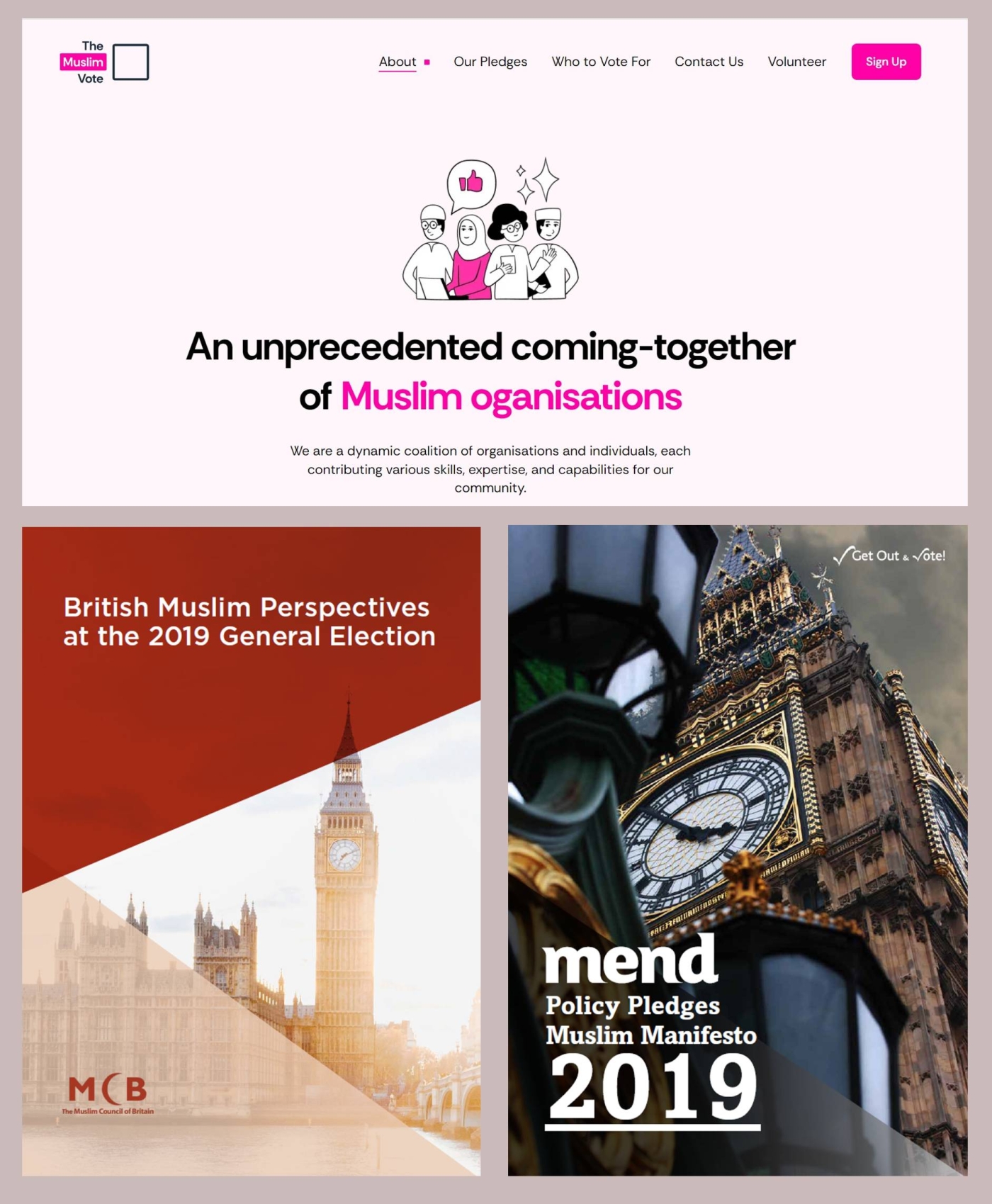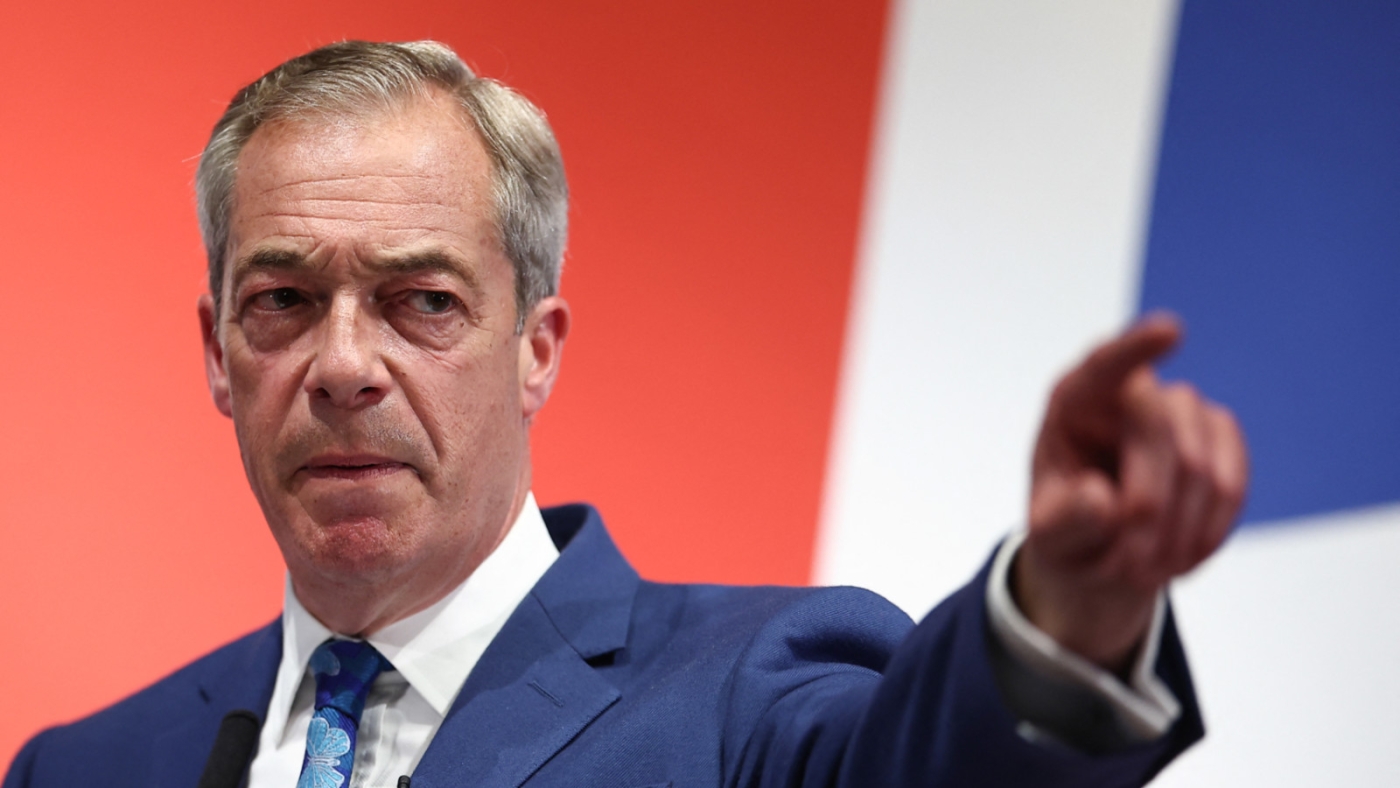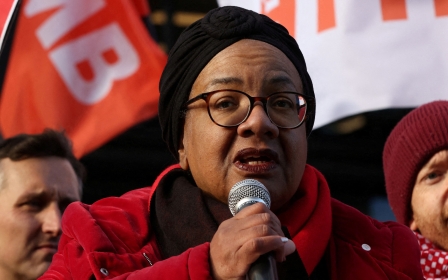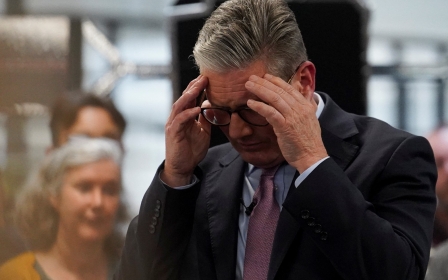UK election: What is The Muslim Vote - and why does it matter?
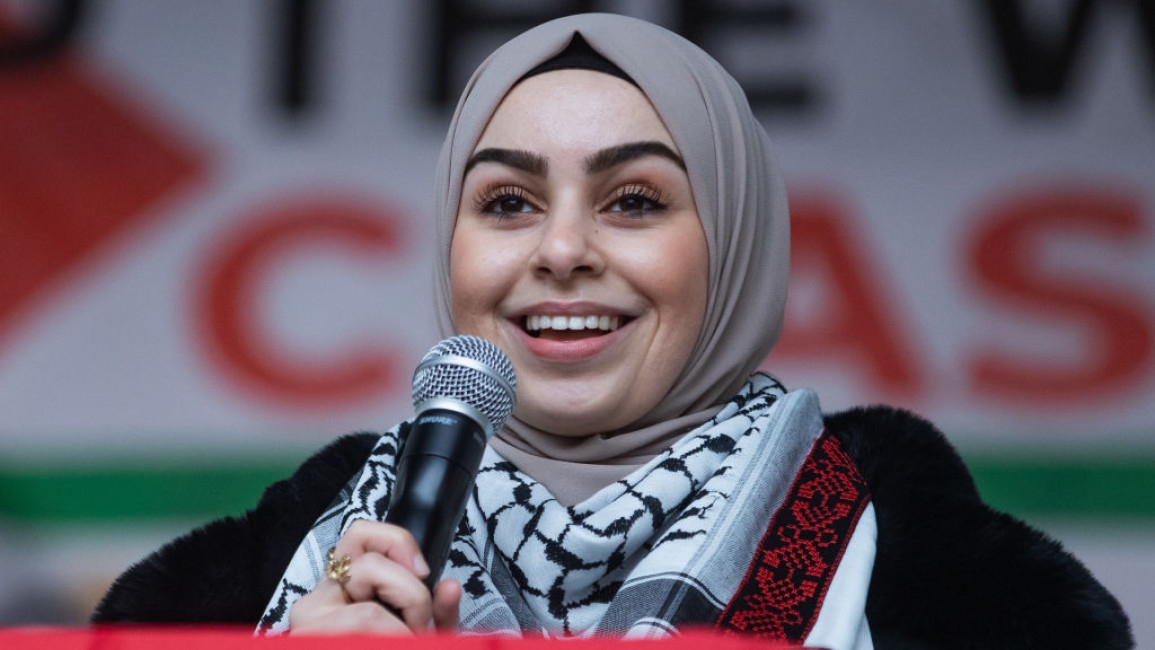
Launched in December 2023, The Muslim Vote (TMV) is a campaign in the UK supporting parliamentary candidates for the upcoming election in constituencies with a significant Muslim electorate.
Much of its driving force has been the early support from the opposition Labour Party, which Muslims traditionally back, for Israel’s war on Gaza. It is also targeting MPs who have failed to vote for a ceasefire.
On Wednesday 5 June, TMV also endorsed select Labour candidates who defied the whip to vote for a ceasefire.
So far it has been endorsed by the Muslim Association of Britain, the Muslim Council of Scotland, the Muslim Council of Wales, and Muslim Engagement and Development (Mend) among others.
But the campaign, aimed at the UK's nearly 4m Muslims - around 6 percent of the electorate - has faced significant criticism.
New MEE newsletter: Jerusalem Dispatch
Sign up to get the latest insights and analysis on Israel-Palestine, alongside Turkey Unpacked and other MEE newsletters
Nigel Farage, parliamentary candidate for Clacton and leader of the right-wing Reform UK, which is seeking to appeal to disaffected Conservative voters, has repeatedly said that "sectarian politics" are threatening Britain, a charge TMV strongly denies.
How does The Muslim Vote work?
The campaign says it is supporting and endorsing politicians and political candidates - both Muslim and non-Muslim - who "support the NHS and public services, and oppose the role of the British government in the ongoing genocide and apartheid in Gaza".
Abubakr Nanabawa, a coordinator and spokesperson for TMV, said it aims to encourage Muslim political engagement and attach a value to the voting power of local Muslim communities.
In January, TMV told MEE that in select constituencies it would support independent candidates with resources, advice, data and volunteers.
The website states that it is not backing any single party: "We personally may or may not even agree with the choice - but we will be true to our stated methodology: respect and report local decisions."
Nanabawa said: "We recognise that Muslims have long voted across the political spectrum. We aim to reflect how the community would like to vote."
What policies does The Muslim Vote support?
The campaign says that it is not political. But it does have a detailed list of pledges providing guiding principles behind who it supports. These include:
War on Gaza: TMV calls for a ceasefire in Gaza, recognition of the state of Palestine, strengthening laws that prevent UK trade with settlements and supporting sanctions on companies operating in the occupied Palestinian territories.
Healthcare: The campaign backs increased council and public health funding for Britain’s most deprived areas.
Policing: TMV wants candidates to commit to addressing discrimination within the justice system. It also opposes the government’s review into Prevent, the controversial counterextremism programme.
Education: It advocates that schoolteachers take cultural and religious sensitivities into account, not least when discussing LGBT issues in schools where most of the community have a religious background.
Nanubawa said: "Democracy is one of the key values of British society. This campaign and Muslims across the country have embraced that and will use their vote to make their voices heard. From the NHS to education, Muslims are part of British life and support the betterment of the diverse communities they live in."
Has a Muslim voter campaign been tried before?
There have been some attempts, but nothing as ambitious. The Muslim Vote differs in how it goes further by explicitly backing select candidates against others.
In previous votes, such as the 2019 election, community organisation Mend produced Muslim manifestos highlighting Muslim-specific political priorities.
In 2015, the grassroots initiative YouElect encouraged more Muslims to register to vote, estimating that ultimately they could influence the results in 32 constituencies. And in 2013 Operation Black Vote conducted research that found 168 constituencies where the number of ethnic minority voters was larger than the winning majority.
Ahead of the 2019 election, the Muslim Council of Britain called on political parties to commit to 10 key pledges, then ranked where the major parties stood on those pledges.
What has happened to Labour's Muslim support?
Traditionally, most Muslim voters in Britain have backed the Labour Party, largely because it usually attracts working-class support and is pro-immigration.
There are 20 constituencies in the UK with an electorate that is more than 30 percent Muslim, out of a total of 650: all backed Labour MPs in 2019. In seven of those, Muslims make up more than 40 percent of the electorate. The Muslim Vote has identified a further 93 constituencies where more than 10 percent of the electorate is Muslim.
But Labour’s Muslim support dropped from 75 percent in 2001 to 38 percent in 2004, after the Iraq war. It climbed by 2015, when 64 percent of Muslims voted for Labour. It peaked at more than 80 percent when Jeremy Corbyn was leader, between 2015 and 2020.
The relationship between Muslims and Keir Starmer’s leadership has changed markedly since his election in 2020 - and especially since 7 October 2023.
Labour has been criticised for supporting Israel’s war on Gaza, not least after Starmer said that Israel "had the right" to withhold power and water from Gaza. Resignations and criticisms by Labour councillors have been dismissed. In November, Starmer ordered his party not to back a ceasefire in a parliamentary vote called by the Scottish National Party: 56 Labour MPs defied him.
The upset among voters became apparent on 1 March, when former Labour MP George Galloway, representing the left-wing Workers Party of Britain, won a by-election landslide in Rochdale, where 27 percent of the population are Muslims.
Labour had withdrawn support for its candidate, Azhar Ali, after it emerged he had made comments about Israel's war on Gaza, for which he later apologised.
At May's local elections, Labour lost a third of its vote share in areas with Muslim majorities.
In the West Midlands mayoral contest, Labour's Richard Parker beat the Conservative incumbent Andy Street by just 1,500 votes - while independent candidate Akhmed Yakoob, who made Israel's war a big part of his campaign, received nearly 70,000 votes.
Yakoob is now standing for parliament in the seat of Birmingham Ladywood, where 43 percent of the electorate are Muslim, against Labour's Shabana Mahmood.
In Oldham and Kirklees, which straddles Greater Manchester and West Yorkshire, Labour lost control of the council to an array of independents and Greens. The party performed worst in wards with the most Muslim voters, with one retiring councillor saying the "Gaza issue" could have lost them the seat.
In Greater Manchester, however, Labour mayor Andy Burnham comfortably retained his position. So did Labour’s Sadiq Khan, the mayor of London. Both Burnham and Khan have a significant number of Muslim constituents - and both are widely considered to be pro-Palestinian.
"For too long the Labour Party has taken [the Muslim vote] for granted and forgotten they need to earn it," said Nanabawa. "Like any other group, the Muslim community has the right to mobilise behind candidates."
So has Labour’s policy on Gaza changed?
During the local elections in early May, a Labour Party "source" told the BBC the close West Midlands mayoral contest was a result of the "Middle East not the West Midlands", calling Hamas the "real villains". Labour’s high command quickly disowned the briefing and called it racist.
Jess Phillips MP, who had voted for a ceasefire and resigned from her ministerial position in November, said the party had some "searching" to do.
Labour’s stance on Gaza has since shifted. Shadow Foreign Secretary David Lammy said in November that it "can be legally justified" for Israel to bomb refugee camps. In early May, he suggested that Nelson Mandela would have opposed the student protests for Gaza on US campuses.
But in late May Lammy backed the International Criminal Court (ICC) after its chief prosecutor, Karim Khan, announced he would be seeking arrest warrants for Israeli and Hamas leaders, including Israel's Prime Minister Benjamin Netanyahu.
On 27 May, a video emerged of deputy leader Angela Rayner telling Muslim voters in her constituency that Labour supports the ICC, promising that a Labour government would recognise the State of Palestine while warning it would only have "limited" influence on the situation in Gaza.
LabourList reported on 31 May that 16 Labour-held seats with a significant number of Muslim voters are being described by the party as "battleground areas". These include seats where Labour MPs hold large majorities, but face challenges from independent candidates.
Party leader Starmer, though, has refused to say whether he would back the ICC if it does issue an arrest warrant for Netanyahu.
In the first week of the election campaign, Labour also dropped parliamentary candidate Faiza Shaheen for liking posts critical of Israel and its supporters. Afterwards, Shaheen distanced herself from some of the liked posts, but said she didn’t believe they warranted her suspension.
Where is The Muslim Vote offering support?
TMV is backing both Muslim and non-Muslim candidates in constituencies:
Ilford North: Shadow Health Secretary Wes Streeting faces a challenge from British-Palestinian independent candidate Leanne Mohamad for his east London seat, which has a Muslim population of 31.3 percent.
Holborn & St Pancras: Keir Starmer is being challenged for his seat in Holborn & St Pancras by South African Jewish former politician and Nelson Mandela ally Andrew Feinstein, a critic of Starmer’s record on Gaza, who is running as an independent.
Leicester South: In the East Midlands, another independent candidate, Shockat Adam, is standing against Labour MP Jon Ashworth.
Rochdale: George Galloway is standing again for his Workers Party, despite being elected only a few weeks ago.
Islington North: Former Labour leader Jeremy Corbyn is standing as an independent in the constituency he has represented since 1983, after he was barred from standing for the party.
The campaign is also supporting multiple Scottish National Party (SNP) and Green Party candidates, as well as the leader of the Liberal Democrats, Ed Davey, who backed a ceasefire in November; and Tom Morrison, a Liberal Democrat standing against Conservative MP Mary Robinson in Cheadle.
On Wednesday 5 June, TMV also endorsed select Labour candidates who defied the whip to vote for a ceasefire - Naz Shah in Bradford West, Afzal Khan in Manchester Rusholme and Yasmin Qureshi in Bolton South and Walkden.
The complete list of candidates TMV has endorsed can be found here.
What have people said about The Muslim Vote?
After the local elections in May, TMV announced a set of demands - mirroring the pledges on its website - for Labour to meet in order to gain its support. Conservative MP Andrew Percy described them as a threat to national security and democratic values.
He warned the Labour leader: "UK politics is facing an increasing threat from extremism and division and many of these demands would do nothing to prevent that and everything to increase divisions."
Former Conservative leader Iain Duncan Smith, meanwhile, described TMV as a threat to democracy and likened the demands to blackmail.
Tanmanjeet Singh Dhesi, Labour's shadow minister for exports, who is defending his seat in Slough, also criticised TMV after it announced it was backing an independent candidate, Azhar Chohan, against him.
"Some are trying to toxify town and divide our diverse community by importing toxic politics of persuading people to vote based on religion or biradari [clan] - asking one faith to 'vote in a block'," he said on 25 May. Dhesi abstained on the November ceasefire vote in parliament, which is why TMV is running a candidate against him.
Sayeeda Warsi, a Conservative member of the House of Lords, resigned from the government in 2014 over its support for Israel and subsequently attacked her party for its failure to combat Islamophobia.
Warsi voiced her support for Dhesi, describing the MP as an ally in fighting Islamophobia - in what appeared to be a rebuke of TMV.
Middle East Eye delivers independent and unrivalled coverage and analysis of the Middle East, North Africa and beyond. To learn more about republishing this content and the associated fees, please fill out this form. More about MEE can be found here.


